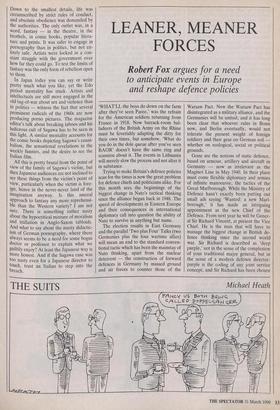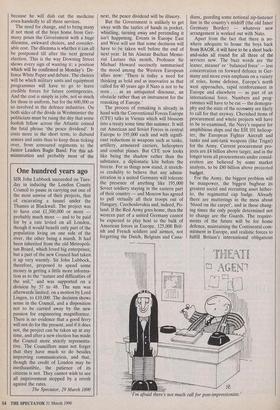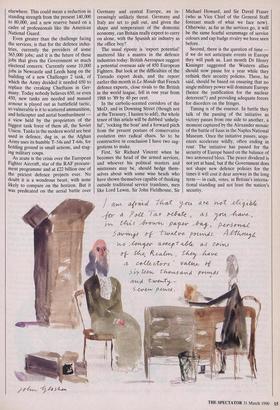LEANER, MEANER FORCES
Robert Fox argues for a need
to anticipate events in Europe and reshape defence policies
`WHAT'LL the boys do down on the farm after they've seen Paree,' was the refrain for the American soldiers returning from France in 1918. Now barrack-room bal- ladeers of the British Army on the Rhine must be feverishly adapting the ditty for their own times, but somehow, 'What do you do in the dole queue after you've seen BAOR' doesn't have the same ring and scansion about it. The events in Lithuania will merely slow the process and not alter it in substance.
Trying to make Britain's defence policies scan for the times is now the great problem for defence chiefs and politicians alike. For this month sees the beginnings of the biggest change in Nato's tactical thinking since the alliance began back in 1948. The speed of developments in Eastern Europe and their consequences in international diplomacy call into question the ability of Nato to survive in anything but name.
The election results in East Germany and the parallel 'Two plus Four' Talks (two Germanies plus the four wartime allies) will mean an end to the standard conven- tional tactic which has been the mainstay of Nato thinking, apart from the nuclear deterrent — the construction of forward defences in Germany by massed ground and air forces to counter those of the Warsaw Pact. Now the Warsaw Pact has disintegrated as a military alliance, and the Germanies will be united; and it has long been clear that whoever rules in Bonn now, and Berlin eventually, would not tolerate the present weight of foreign soldiery and their gear on German soil whether on ecological, social or political grounds.
Gone are the notions of static defence, based on armour, artillery and aircraft in Germany — now as irrelevant as the Maginot Line in May 1940. In their place must come flexible diplomacy and armies of infinite manoeuvre, the tactics of the Great Marlborough. While the Ministry of Defence hasn't exactly been putting out small ads saying 'Wanted: a new Marl- borough,' it has made an intriguing appointment as the new Chief of the Defence. From next year he will be Gener- al Sir Richard Vincent, at present the Vice Chief. He is the man that will have to manage the biggest change in British de- fence thinking since the second world war. Sir Richard is described as 'deep purple,' not in the sense of the complexion of your traditional major general, but in the sense of a modern defence director: purple is the coding of any joint service concept, and Sir Richard has been chosen because he will dish out the medicine even-handedly to all three services.
The need for change, and to bring many if not most of the boys home from Ger- many poses the Government with a huge dilemma, awkward choices, and consider- able cost. The dilemma is whether it can all be postponed till after the next general election. This is the way Downing Street shows every sign of wanting it; a position which will be confirmed in Monday's De- fence White Paper and debate. The choices will be which military units and equipment programmes will have to go to leave credible forces for future contingencies. And the cost is simply in jobs, not so much for those in uniform, but for the 600,000 or so involved in the defence industries. On both sides of the divide in Westminster the politicians must be ruing the day that some foolish fellow across the Atlantic coined the fatal phrase 'the peace dividend'. It costs more in the short term, to disband armies and units than to keep them ticking over, from armoured regiments to the Junior Leaders Bugle Band. For this ad- ministration and probably most of the next, the peace dividend will be illusory.
But the Government is unlikely to get away with the tactics of hands in pocket, whistling, turning away and pretending it isn't happening. Events in Europe East and West will see that some decisions will have to be taken well before the end of next year. In his Alastair Buchan Memo- rial Lecture this month, Professor Sir Michael Howard succinctly summarised the mood among the Western European allies now: 'There is today a need for thinking as bold and as innovative as that called for 40 years ago if Nato is not to be seen . . . as an antiquated dinosaur, an obstacle rather than an instrument for the remaking of Europe.'
The process of remaking is already in hand with the Conventional Forces Europe (CFE) talks in Vienna which will blossom into a treaty some time this summer. It will cut American and Soviet Forces in central Europe to 195,000 each and with signifi- cant reductions in weapons such as tanks, artillery, armoured carriers, helicopters and combat planes. But CFE now looks like being the shadow rather than the substance, a diplomatic kite before the breeze. For as things now stand, it stretch- es credulity to believe that any admin- istration in a united Germany will tolerate the presence of anything like 195,000 Soviet soldiery staying in the eastern part of their country — and Moscow has agreed to pull virtually all their troops out of Hungary, Czechoslovakia and, indeed, Po- land. If the Red Army goes home, then the western part of a united Germany cannot be expected to play host to the bulk of American forces in Europe, 125,000 Brit- ish and French soldiers and airmen, not forgetting the Dutch, Belgians and Cana- dians, guarding some notional zip-fastener line in the country's midriff (the old Inner Germany Border) — whatever new arrangement is worked out with Nato.
Apart from the fact that there is no:- where adequate to house the boys back from BAOR, it will have to be a short back- and-sides all round for all three of the services now. The buzz words are 'the leaner, meaner' or balanced force' — less concentration on forward defence in Ger- many and more even emphasis on a variety of roles, home defence, Europe's north west approaches, rapid reinforcement in Europe and elsewhere — as part of an international force. Numbers and prog- rammes will have to be cut — the demogra- phy and the state of the economy are likely to call for that anyway. Cherished items of procurement and whole projects will have to be re-examined, the Navy's request for amphibious ships and the EH 101 helicop- ter, the European Fighter Aircraft and tanks and anti-tank weapons (like Trigat) for the Army. Current procurement pro- jects are £4 billion above target, and in the longer term all procurements under consid- eration are believed by some market analysts, to be £80 billion above projected budget.
For the Army, the biggest problem will be manpower, the biggest bugbear its greatest social and recruiting asset hither- to, the regimental cap badge. Already there are mutterings in the mess about `blood on the carpet', and in these chang- ing times the only people determined not to change are the Guards. The require- ments of the future will be for home defence, maintaining the Continental com- mitment in Europe, and realistic forces to fulfill Britain's international obligations afraid there's not much call for post-impressionists.' elsewhere. This could mean a reduction in standing strength from the present 140,000 to 80,000, and a new reserve based on a cadre of professionals like the American National Guard.
Even greater than the challenge facing the services, is that for the defence indus- tries, currently the providers of some 565,000 jobs; and it is the future of these jobs that gives the Government so much electoral concern. Currently some 10,000 jobs in Newcastle and Leeds hang on the building of a new Challenger 2 tank, of which the Army decided it needed 650 to replace the creaking Chieftains in Ger- many. Today nobody believes 650, or even 450, new tanks are needed and massed armour is played out as battlefield tactic, so vulnerable is it to scattered ammunition, and helicopter and aerial bombardment a view held by the proprietors of the biggest tank force of them all, the Soviet Union. Tanks in the modern world are best used in defence, dug in, as the Afghan Army uses its humble T-54s and T-64s, for holding ground in small actions, and stag- ing military coups. As acute is the crisis over the European Fighter Aircraft, star of the RAF procure- ment programme and at £22 billion one of the priciest defence projects ever. No doubt it is a wondrous beast, with none likely to compare on the horizon. But it was predicated on the aerial battle over Germany and central Europe, an in- creasingly unlikely threat. Germany and Italy are set to pull out, and given the shape and temperature of the domestic economy, can Britain really expect to carry on alone, with the Spanish air industry as the office boy?
The usual riposte is 'export potential' muttered like a mantra in the defence industries today: British Aerospace suggest a potential overseas sale of 850 European Fighters. But look at the difficulties of the Tornado export deals, and the report earlier this month in Le Monde that French defence exports, close rivals to the British in the world league, fell in one year from 1988 to '89 by 40 per cent.
In the carbolic-scented corridors of the MoD, and in Downing Street (though not at the Treasury, I hasten to add), the whole tenor of this article will be dubbed 'unhelp- ful', 'rocking the boat' and a forward pitch from the present posture of conservative evolution into radical chaos. So to be constructive in conclusion I have two sug- gestions to make.
First, Sir Richard Vincent when he becomes the head of the armed services, and whoever his political masters and mistresses may be, should hedge them- selves about with some wise heads who have shown themselves capable of thinking outside traditional service tramlines, men like Lord Lewin, Sir John Fieldhouse, Sir Michael Howard, and Sir David Fraser (who as Vice Chief of the General Staff forecast much of what we face now). Otherwise, as far as the services go, it will be the same fearful scrummage of service colours and cap badge rivalry we have seen before.
Second, there is the question of time if we do not anticipate events in Europe they will push us. Last month Dr Henry Kissinger suggested the Western allies should now pause for a year while they rethink their security policies. These, he said, should be based on ensuring that no single military power will dominate Europe (hence the justification for the nuclear deterrent?) and providing adequate forces for disorders on the fringes.
Timing is of the essence. In battle they talk of the passing of the initiative as victory passes from one side to another, a moment captured by the Alexander mosaic of the battle of Issus in the Naples National Museum. Once the initiative passes, sequ- ences accelerate wildly, often ending in rout. The initiative has passed for the security of Europe based on the balance of two armoured blocs. The peace dividend is not yet at hand, but if the Government does not shape new defence policies for the times it will cost it dear anyway in the long term — in cash, votes, in Britain's interna- tional standing and not least the nation's security.




























































 Previous page
Previous page